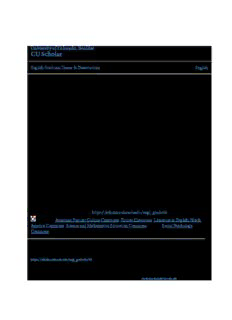
Post-Apocalyptic Desires, Science Distrust, and the De(con) PDF
Preview Post-Apocalyptic Desires, Science Distrust, and the De(con)
University of Colorado, Boulder CU Scholar English Graduate Theses & Dissertations English Spring 1-1-2014 Bring an Axe and Your Wildest Dreams: Post- Apocalyptic Desires, Science Distrust, and the De(con)struction of a Zombie Story Samantha Jo Long University of Colorado at Boulder, [email protected] Follow this and additional works at:https://scholar.colorado.edu/engl_gradetds Part of theAmerican Popular Culture Commons,Fiction Commons,Literature in English, North America Commons,Science and Mathematics Education Commons, and theSocial Psychology Commons Recommended Citation Long, Samantha Jo, "Bring an Axe and Your Wildest Dreams: Post-Apocalyptic Desires, Science Distrust, and the De(con)struction of a Zombie Story" (2014).English Graduate Theses & Dissertations. 62. https://scholar.colorado.edu/engl_gradetds/62 This Thesis is brought to you for free and open access by English at CU Scholar. It has been accepted for inclusion in English Graduate Theses & Dissertations by an authorized administrator of CU Scholar. For more information, please [email protected]. BRING AN AXE AND YOUR WILDEST DREAMS: POST-APOCALYPTIC DESIRES, SCIENCE DISTRUST, AND THE DE(CON)STRUCTION OF A ZOMBIE STORY by SAMANTHA JO LONG B.A., Illinois State University, 2011 A thesis submitted to the Faculty of the Graduate School of the University of Colorado in partial fulfillment of the requirement for the degree of Master of Arts Department of English 2014 This thesis entitled: Bring an Axe and Your Wildest Dreams: Post-Apocalyptic Desires, Science Distrust, and the De(con)struction of a Zombie Story written by Samantha Jo Long has been approved for the Department of English Richelle Munkhoff Stephen Graham Jones Date _ The final copy of this thesis has been examined by the signatories, and we Find that both the content and the form meet acceptable presentation standards Of scholarly work in the above mentioned discipline. iii Long, Samantha Jo (M.A., English) Bring an Axe and Your Wildest Dreams: Post-Apocalyptic Desires, Science Distrust, and the De(con)struction of a Zombie Story Thesis directed by Assistant Professor Richelle Munkhoff Observing the current popularity of the zombie narrative in American culture, this thesis explores the questions “why zombie?” and “why now?” through a combination of research and the creation of an original zombie story. Moving beyond existing criticism which argues that the zombie transforms to fit each generation’s specific fears, I argue that zombie movies, novels, and video games from George A. Romero-onwards continually speak to a distrust of science and scientific progress while additionally romanticizing the post-apocalyptic landscape. Consequently, the zombie’s unprecedented mainstream popularity over the last fifteen years could be read as symptomatic of this distrust intensifying, paralleling an increasing politicization of science and a rise in apocalyptic thinking within the public sphere. Through the deconstruction of my own zombie story, I uncover not only what these timely narratives tell us about our perceptions of the future, but also how they can help us change them. . DEDICATION In memoriam To my dad, my biggest fan, who keeps me writing. “And may your song always be sung.” All of my love, always. v ACKNOWLEDGEMENTS Special thanks to Richelle Munkhoff for her guidance throughout this project, to my committee members Adam Bradley and Stephen Graham Jones for their invaluable feedback, and to Greg for his editing and patience with all-things-zombie over the past two years. vi CONTENTS PROLOGUE……….……………………..……………………………………..……...1 CHAPTER I. A WANNABE ZOMBIE WRITER..........................................................2 II. SOLEMN SOLON SPRINGS, WISCONSIN ..........................................7 III. A BRIEF HISTORY OF “WHY ZOMBIES?” ........................................9 IV. THE PUSH NORTH ...............................................................................17 V. APOCALYPSE NOW? ..........................................................................20 VI. WALKIN’ TALL MACHINE GUN MAN ............................................31 VII. THE POST-APOCALYPTIC DREAM ..................................................35 VIII. REUNION ...............................................................................................42 IX. MAD SCIENCE......................................................................................44 X. DREAMLAND .......................................................................................50 XI. INTERLUDE ..........................................................................................52 XII. FANTASYLAND ...................................................................................53 XIII. WHO’S AFRAID OF SCIENCE? ...........................................................60 XIV. RED IN THE MORNING .......................................................................65 XV. IN THE RIGHT CORNER .....................................................................68 XVI. ALL ABOARD .......................................................................................74 XVII. AND IN THE LEFT ................................................................................83 XVIII. HOME ON THE RANGE .......................................................................91 XIX. SHORT LISTS .........................................................................................93 XX. ANIMAL .................................................................................................94 vii XXI. THE ANTI-ZOMBIE NARRATIVE ......................................................96 XXII. BREAK....................................................................................................97 XXIII. AUTHOR INTERVENTION................................................................102 XXIV. ZOMBIE EX MACHINA .....................................................................104 XXV. THE ZOMBIE AS NEGOTIATOR ......................................................106 XXVI. HOW DOES A RADIO WORK? .........................................................111 XXVII.DON’T KNOW MUCH ABOUT SCIENCE BOOKS ........................112 XXVIII.ALIVE 550 AM ....................................................................................119 EPILOGUE……….……………………..………………………………………......122 BIBLIOGRAPHY……………………..…………………………………………….125 viii TABLES Table 1. A Selection of Zombie Films by Year ..........................................................46 2. A Selection of Zombie Stories by Year ........................................................47 3. A Selection of Zombie Video Games by Year .............................................47 1 PROLOGUE When I first began working on an English master’s thesis, I knew that a strictly by-the- book approach would be insufficient for my ambitions. While my scholarly interest in zombies started traditionally enough, borne from multiple seminars about plague narratives at the beginning of my master’s program, a wholly scholarly mindset—and style—was not my chief aspiration. After all, my interest in zombies and their contemporary significance stretched far beyond formal educational experiences; I was a fan, and zombie books, movies, and video games were my hobby. I longed to share my thoughts fan-to-fan as much as scholar-to-scholar, to write about popular culture in a way that was welcoming to those who made up popular culture and had made the undead worthy of such an inquiry in the first place. I also wanted to create—to incorporate a zombie story I had begun just “for fun”—showing not only how research and the production of fiction are intricately linked, but also revealing my process as I came to form an argument (and as that argument subsequently transformed my fiction). “Why not do it?” My advisor asked. So I decided to give it a shot. The layout that follows is relatively simple. Each new chapter moves back and forth between “academic” nonfiction and my story. Of course, as both develop the divisions become less clear, reflecting their enmeshment. What hopefully results is an immersive experience, where intellectual and creative mindsets meet to work on the biggest question of all—why zombies now?
Description: